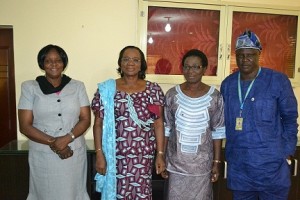
Ekiti State Deputy Governor, Prof. Modupe Adelabu, (2nd left), Mrs. Justina Onifade (left), UNICEF Country Representative, Mrs. Valentina Solarin, (2nd right) and the Commissioner I in the State Universal Education Board (SUBEB) Hon. Bunmi Awotiku after the stakeholders meeting on Early Childhood Education.
Ekiti State Deputy Governor Prof Modupe Adelabu has explained the reason for the huge investment in education development by the Governor Kayode Fayemi-led administration. Education is number four on the Eight-Point Agenda chart of the state government.
According to the deputy governor, the investment was to ensure that children, including those in the remotest parts of the state, have unfettered access to both qualitative and quantitative education.
Prof Modupe Adelabu made the clarification in her capacity as the Chairman of the State Universal Basic Education Board (SUBEB) at a meeting with representatives of the United Nations Children Education Fund (UNICEF), stakeholders on the Coordination of Early Childhood Education (ECD) and Community-Based Child Care (CBCC). She told her audience that the present administration established Model Early Child Care Centers (ECCC) in most public schools as a demonstration of its commitment to early child education.
The deputy governor said the move was to enable the children have access to quality education early in life irrespective of whether they reside in urban centres or at the hinterlands.
“We know the importance of early child care in Ekiti State. The first Model Early Child Care Centre established by the present administration is one of the best in Africa’s South of the Sahara. The plan is to replicate such centres in all the local government areas of the state,” she said.
Prof Modupe informed that three of such centres (with one in each of the senatorial zones) have been built by the government. The facilities, she noted are in Ado-Ekiti, Ikere-Ekiti and Ikole-Ekiti.
Acknowledging UNICEF’s interventions in child development in Africa generally and Nigeria in particular, the deputy governor expressed the readiness of the Ekiti State government to sustain its partnership with the United Nations (UN) agency to further expand the scope of early child development programmes to children in the state.
In her own remark, the UNICEF Country Representative, Mrs. Valentina Solarin, lamented that little attention was being paid to early child education and development in some parts of the world. She, however, commended Ekiti State government for its laudable efforts and the infrastructure put in place for early childhood development and education.
Mrs. Solarin explained that ECD is not restricted to child education alone, but a dimensional concept which has to do with physical, linguistic, cognitive and socio-cultural development of the child between 0-8 years. The UNICEF official stressed the need for stakeholders, particularly parents, teachers, partnering organizations and relevant ministries and agencies to collaborate rather than compete among themselves.
She noted that their efforts can only be properly coordinated to achieve total childhood development through collaboration.
Stakeholders at the meeting included: SUBEB officials, Ministry of Education and Technology Development, Ministry of Women and Gender Empowerment, Agency for Adult and Non-Formal Education among others.
Last modified: August 6, 2013
